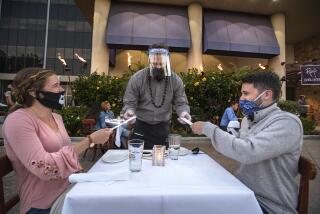Way Cleared for First Outdoor Test of Genetically Altered Bacteria
- Share via
SACRAMENTO — A Superior Court judge Thursday cleared the way for a research firm to stage the nation’s first authorized outdoor test of genetically altered bacteria.
Representatives of Oakland-based Advanced Genetic Sciences said immediately after the judge’s ruling that they will spread the frost-inhibiting bacteria on plants in Contra Costa County this morning.
Sacramento County Superior Court Judge Darrel Lewis refused environmentalists’ request to delay the test to allow for a more thorough environmental review of possible effects, saying that federal and state agencies conducted proper reviews before granting permits for the experiment.
“There appears to be no chance of harm to animals or people,” Lewis said, in declining an injunction.
An attorney for the opposing environmental groups, James Penrod, said that even if his clients decided to appeal, there appeared to be little time to file papers with a state appellate court before offices closed Thursday.
The judge also imposed a condition that the groups would have to post a $100,000 bond if they pursued the case, because he said it appeared that further delays would cost the company money.
Last week, Advanced Genetic Sciences postponed application of the bacteria on April 17 at the request of the judge, who said he needed time to prepare for Thursday’s court hearing.
The company’s attorney, Terry J. Houlihan, said Advanced Genetic Sciences voluntarily delayed the test to avoid a hurried ruling by the judge on environmentalists’ request for a temporary restraining order.
Advanced Genetic Sciences attorneys argued Thursday that the experiment would be safe. Nothing else has been so thoroughly scrutinized before its field application as the pseudomonas syringae bacteria, known as Frostban, they said.
The experiment has been approved by the U.S. Environmental Protection Agency, the state Department of Food and Agriculture and the state Department of Health Services.
The firm plans to apply Frostban to 2,400 strawberry plants on the edge of Brentwood in rural Contra Costa County, about 50 miles northeast of San Francisco.
Frostban has been shown in laboratory trials to knock out a frost-promoting bacteria and protect plants from frost damage at temperatures as low as 23 degrees Fahrenheit. Frost damage costs U.S. farmers an estimated $1.6 billion annually.
But attorneys for the environmental groups argued that much is unknown about potential effects of releasing the bacteria into the atmosphere.
The University of California is planning similar tests of a bacteria on potato fields near Tulelake, about five miles south of the Oregon border. Researchers have said that the potatoes will be planted late this month or in early May and the application of the bacteria will come later.
More to Read
Sign up for Essential California
The most important California stories and recommendations in your inbox every morning.
You may occasionally receive promotional content from the Los Angeles Times.










